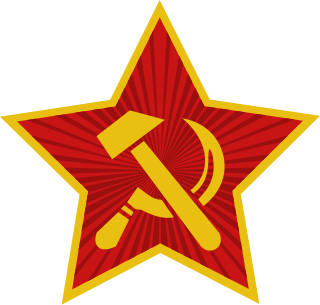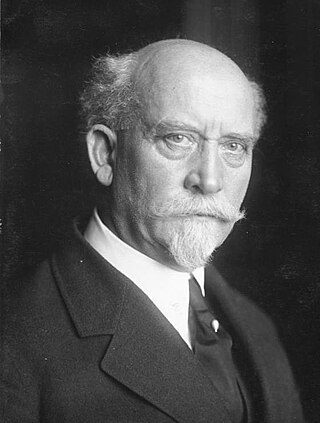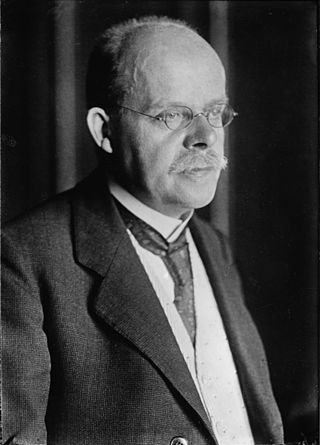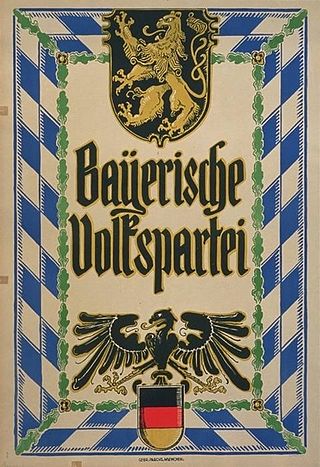
The Weimar Republic, officially known as the German Reich, was a historical period of Germany from 9 November 1918 to 23 March 1933, during which it was a constitutional federal republic for the first time in history; hence it is also referred to, and unofficially proclaimed itself, as the German Republic. The period's informal name is derived from the city of Weimar, which hosted the constituent assembly that established its government. In English, the republic was usually simply called "Germany", with "Weimar Republic" not commonly used until the 1930s.

The Enabling Act of 1933, officially titled Gesetz zur Behebung der Not von Volk und Reich, was a law that gave the German Cabinet – most importantly, the Chancellor – the power to make and enforce laws without the involvement of the Reichstag or Weimar President Paul von Hindenburg, leading to the rise of Nazi Germany. Critically, the Enabling Act allowed the Chancellor to bypass the system of checks and balances in the government.

The German People's Party was a conservative-liberal political party during the Weimar Republic that was the successor to the National Liberal Party of the German Empire. Along with the left-liberal German Democratic Party (DDP), it represented political liberalism in Germany between 1918 and 1933.

The German Democratic Party was a liberal political party in the Weimar Republic, considered centrist or centre-left. Along with the right-liberal German People's Party, it represented political liberalism in Germany between 1918 and 1933. It was formed in 1918 from the Progressive People's Party and the liberal wing of the National Liberal Party, both of which had been active in the German Empire.

The Communist Party of Germany was a major far-left political party in the Weimar Republic during the interwar period, an underground resistance movement in Nazi Germany, and a minor party in West Germany during the postwar period until it was banned by the Federal Constitutional Court in 1956.

Philipp Heinrich Scheidemann was a German politician of the Social Democratic Party of Germany (SPD). In the first quarter of the 20th century he played a leading role in both his party and in the young Weimar Republic. During the German Revolution of 1918–1919 that broke out after Germany's defeat in World War I, Scheidemann proclaimed a German Republic from a balcony of the Reichstag building. In 1919 he was elected Reich Minister President by the National Assembly meeting in Weimar to write a constitution for the republic. He resigned the office the same year due to a lack of unanimity in the cabinet on whether or not to accept the terms of the Treaty of Versailles.

The Centre Party, officially the German Centre Party and also known in English as the Catholic Centre Party, is a Christian democratic political party in Germany. Influential in the German Empire and Weimar Republic, it is the oldest German political party in existence. Formed in 1870, it successfully battled the Kulturkampf waged by Chancellor Otto von Bismarck against the Catholic Church. It soon won a quarter of the seats in the Reichstag, and its middle position on most issues allowed it to play a decisive role in the formation of majorities. The party name Zentrum (Centre) originally came from the fact that Catholic representatives would take up the middle section of seats in parliament between the social democrats and the conservatives.

Otto Braun was a politician of the Social Democratic Party of Germany (SPD) during the Weimar Republic. From 1920 to 1932, with only two brief interruptions, Braun was Minister President of the Free State of Prussia. The continuity of personnel in high office resulted in a largely stable government in Prussia, in contrast to the sometimes turbulent politics of the Reich. During his term of office, Prussia's public administration was reorganized along democratic lines. He replaced many monarchist officials with supporters of the Weimar Republic, strengthened and democratized the Prussian police, and made attempts to fight the rise of the Nazi Party.

Wilhelm Marx was a German judge, politician and member of the Catholic Centre Party. During the Weimar Republic he was the chancellor of Germany twice, from 1923–1925 and 1926–1928, and served briefly as the minister president of Prussia in 1925. With a total of 3 years and 73 days, he was the longest-serving chancellor during the Weimar Republic.

The Bavarian People's Party was a Catholic political party in Bavaria during the Weimar Republic. After the collapse of the German Empire in 1918, it split away from the national-level Catholic Centre Party and formed the BVP in order to pursue a more conservative and particularist Bavarian course. It consistently had more seats in the Bavarian state parliament than any other party and provided all Bavarian minister presidents from 1920 on. In the national Reichstag it remained a minor player with only about three percent of total votes in all elections. The BVP disbanded shortly after the Nazi seizure of power in early 1933.

The Weimar Coalition is the name given to the coalition government formed by the Social Democratic Party of Germany (SPD), the German Democratic Party (DDP) and the Catholic Centre Party (Z), who together had a large majority of the delegates to the Constituent Assembly that met at Weimar in 1919, and were the principal groups that designed the constitution of the Weimar Republic. These three parties were seen as the most committed to Germany's new democratic system, and together governed Germany until the elections of 1920, when the first elections under the new constitution were held, and both the SPD and especially the DDP lost a considerable share of their votes. Although the Coalition was revived in the ministry of Joseph Wirth from 1921 to 1922, the pro-democratic elements never truly had a majority in the Reichstag from this point on, and the situation gradually grew worse for them with the continued weakening of the DDP. This meant that any pro-republican group that hoped to attain a majority would need to form a "Grand Coalition" with the conservative-liberal German People's Party (DVP), which only gradually moved from monarchism to republicanism over the course of the Weimar Republic and was virtually wiped out politically after the death of their most prominent figure, Foreign Minister Gustav Stresemann in 1929.

Otto Wels was a German politician who served as a member of the Reichstag from 1912 to 1933 and as the chairman of the Social Democratic Party (SPD) from 1919 until his death in 1939. He was military commander of Berlin in the turbulent early days of the German Revolution of 1918–1919, and during the 1920 Kapp Putsch he was instrumental in organizing the general strike that helped defeat the anti-republican putschists. Near the end of the Weimar Republic's life, however, he saw the futility of calling a general strike against the 1932 Prussian coup d'état because of the mass unemployment of the Great Depression.
In the fourteen years the Weimar Republic was in existence, some forty parties were represented in the Reichstag. This fragmentation of political power was in part due to the use of a peculiar proportional representation electoral system that encouraged regional or small special interest parties and in part due to the many challenges facing the nascent German democracy in this period.

Rudolf Breitscheid was a German politician and leading member of the Social Democratic Party of Germany (SPD) during the Weimar Republic. Once leader of the liberal Democratic Union, he joined the SPD in 1912. He defected to the Independent Social Democratic Party of Germany (USPD) in 1917 due to his opposition to the First World War, and rejoined the SPD in 1922. He served as a senior member of and foreign policy spokesman for the SPD Reichstag group during the Weimar Republic, and was a member of the German delegation to the League of Nations. After the Nazi rise to power, he was among the members of the Reichstag who voted against the Enabling Act of 1933, and soon after fled to France to avoid persecution. He was arrested and handed to the Gestapo in 1941, and died in Buchenwald concentration camp in 1944.

Reinhold Maier was a German politician and the leader of the FDP from 1957–1960. From 1946 to 1952 he was Minister President of Württemberg-Baden and then the 1st Minister President of the new state of Baden-Württemberg until 1953.

The Free State of Prussia was one of the constituent states of Germany from 1918 to 1947. The successor to the Kingdom of Prussia after the defeat of the German Empire in World War I, it continued to be the dominant state in Germany during the Weimar Republic, as it had been during the empire, even though most of Germany's post-war territorial losses in Europe had come from its lands. It was home to the federal capital Berlin and had 62% of Germany's territory and 61% of its population. Prussia changed from the authoritarian state it had been in the past and became a parliamentary democracy under its 1920 constitution. During the Weimar period it was governed almost entirely by pro-democratic parties and proved more politically stable than the Republic itself. With only brief interruptions, the Social Democratic Party (SPD) provided the Minister President. Its Ministers of the Interior, also from the SPD, pushed republican reform of the administration and police, with the result that Prussia was considered a bulwark of democracy within the Weimar Republic.

Carl Wilhelm Severing was a German union organizer and Social Democratic politician during the German Empire, Weimar Republic and the early post-World War II years in West Germany. He served as a Reichstag member and as interior minister in both Prussia and at the Reich level where he fought against the rise of extremism on both the left and the right. He remained in Germany during the Third Reich but had only minimal influence on reshaping the Social Democratic Party after World War II.

The Weimar National Assembly, officially the German National Constitutional Assembly, was the popularly elected constitutional convention and de facto parliament of Germany from 6 February 1919 to 21 May 1920. As part of its duties as the interim government, it debated and reluctantly approved the Treaty of Versailles that codified the peace terms between Germany and the victorious Allies of World War I. The Assembly drew up and approved the Weimar Constitution that was in force from 1919 to 1933. With its work completed, the National Assembly was dissolved on 21 May 1920. Following the election of 6 June 1920, the new Reichstag met for the first time on 24 June 1920, taking the place of the Assembly.

The Reichstag of the Weimar Republic (1919–1933) was the lower house of Germany's parliament; the upper house was the Reichsrat, which represented the states. The Reichstag convened for the first time on 24 June 1920, taking over from the Weimar National Assembly, which had served as an interim parliament following the collapse of the German Empire in November 1918.

The Reichstag, officially the Greater German Reichstag after 1938, was the national parliament of Nazi Germany from 1933 to 1945. Following the Nazi seizure of power and the enactment of the Enabling Act of 1933, it functioned purely as a rubber stamp for the actions of Adolf Hitler's dictatorship — always by unanimous consent — and as a forum to listen to Hitler's speeches. In this purely ceremonial role, the Reichstag convened only 20 times, the last on 26 April 1942. The President of the Reichstag throughout this period was Hermann Göring.
















